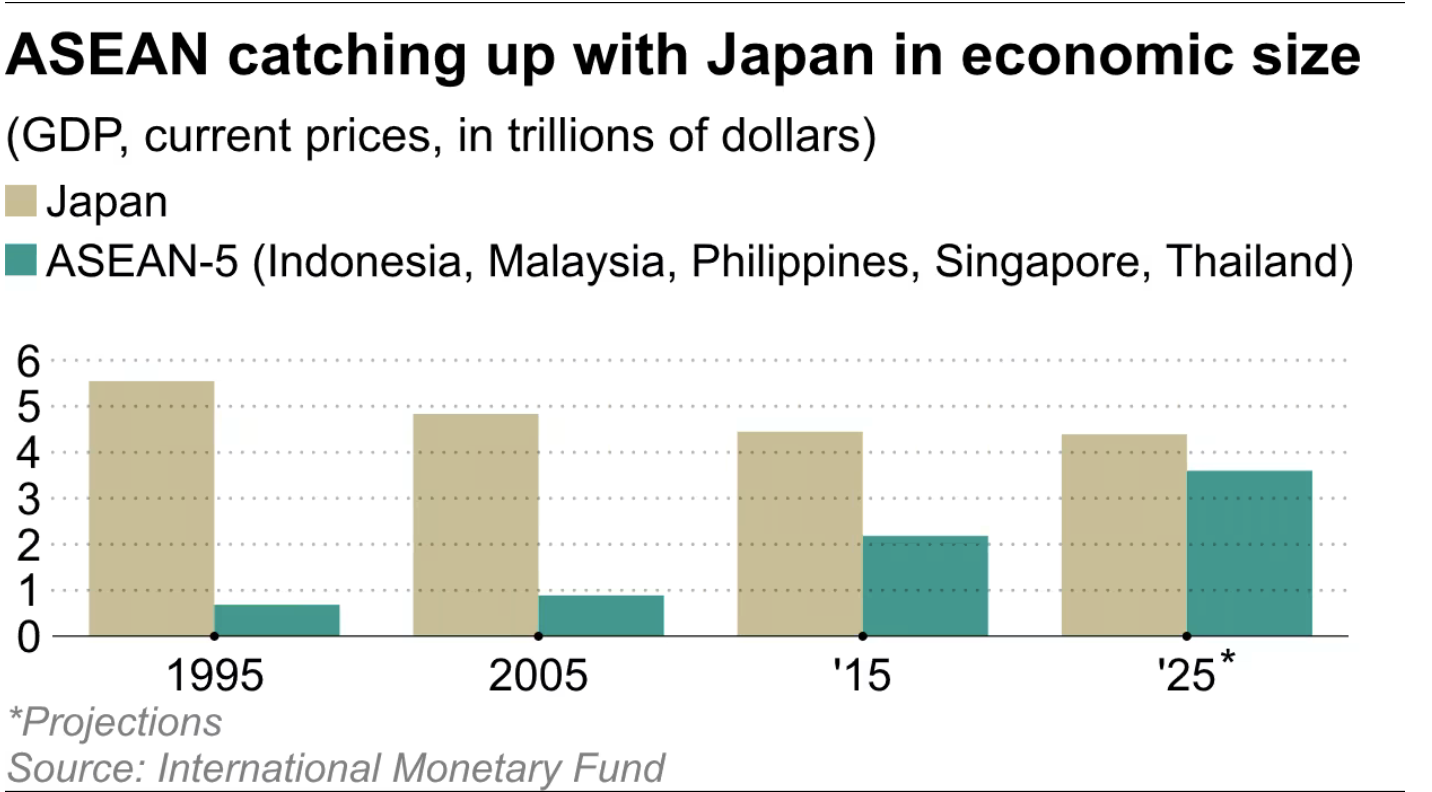Angeline Tan was quoted in Nikkei Asia, 9 January 2025
By YUICHI SHIGA, NORMAN GOH and NANA SHIBATA
Trump 2.0 and BRICS expansion raise stakes for PM’s trip to Malaysia, Indonesia
TOKYO/KUALA LUMPUR/JAKARTA — Japanese Prime Minister Shigeru Ishiba is set to visit Malaysia and Indonesia from Thursday to Sunday, just days before the return of Donald Trump to the U.S. presidency that could impact Asia’s trade and security landscape.
Ishiba, who took office in October, chose the two ASEAN members for his first overseas visit, excluding international conferences. He is slated to hold summits with Malaysian Prime Minister Anwar Ibrahim and Indonesian President Prabowo Subianto, looking to cement economic and defense ties with Southeast Asian countries that are expanding their international presence.
Malaysia and Indonesia implement balanced diplomacy and are increasingly building ties with Global South nations, with the latter becoming a full member of the BRICS grouping of emerging economies days ago. They also draw attention as global supply chain hubs amid U.S.-China tensions, posing a fresh challenge for Japan regarding how far Tokyo can impact actual economic and defense activities in Southeast Asia amid the uncertainties.
“Our cooperation with Southeast Asia, which is a strategic location for maritime traffic and a global growth center, is essential,” Yoshimasa Hayashi, Japan’s chief cabinet secretary, said in a press conference late last month. He noted that Malaysia is this year’s ASEAN chair and Indonesia is the largest economy in Southeast Asia.
Japan has tapped the region’s rapidly growing market, with recent Ishiba predecessors Fumio Kishida, Yoshihide Suga and Shinzo Abe also choosing Southeast Asia as their first overseas destinations.
Tokyo has been a major provider of official development assistance to Southeast Asia and recently promoted the region’s decarbonization by leading the Asia Zero Emission Community, a multilateral initiative that most ASEAN members joined.
Yet Japan’s economic presence in the region is overshadowed by that of China. ASEAN’s trade with Asia’s largest economy reached $722 billion in 2022, accounting for 19% of the total and 170% more than that of Japan, data from the ASEAN Secretariat shows.
The economic balance between Japan and Southeast Asian countries also has changed over time. The International Monetary Fund projects the gross domestic product of ASEAN-5 — Indonesia, Malaysia, the Philippines, Singapore and Thailand — will reach $3.6 trillion in 2025, compared with Japan at $4.39 trillion. Japan’s GDP was eight times larger than that of the ASEAN-5 three decades ago.
Japan’s GDP per capita in 2023 of $33,900 was still over five times larger than that of the ASEAN-5. But the capital cities of Malaysia and Indonesia are rapidly catching up, with Kuala Lumpur at 127,000 ringgit ($28,000) and Jakarta at 322 million rupiah ($20,000).

Analysts cite several areas of deeper cooperation in which Japan could play a role.
“Japan has shown growing interest in Malaysia’s [liquefied natural gas], particularly in Sarawak,” Angeline Tan, an analyst at the Institute of Strategic and International Studies Malaysia, told Nikkei Asia, referring to the eastern Malaysian state that is a hub for the energy industry. “Ishiba’s visit could pave the way for greater collaboration in green transformation and decarbonization.”
Fikry Rahman, head of foreign affairs at Malaysian think tank Bait Al Amanah, said that Kuala Lumpur envisions Japan aiding in the country’s ambition to develop the high-end semiconductor industry, including by direct investments, knowledge transfer and education partnerships.
As for Indonesia, Prabowo’s flagship policies, such as self-sufficiency in food productionand a newly launched nationwide free school meal program, could offer opportunities for Japan.
“With regard to ideas of food security and energy security … Indonesia seems to be willing to take Japan as the country’s strategic partner,” Teuku Rezasyah, associate professor in international relations at Padjadjaran University, told Nikkei Asia.
Muhammad Waffaa Kharisma, a researcher at the Jakarta-based Center for Strategic and International Studies, agreed.
“The Indonesian government remains as optimistic as ever about Japan’s role as a close international partner in supporting Indonesia’s fiscal-heavy development agenda focusing on food security and human resources,” he said, citing the program of free lunch for schoolchildren and the “food estate” project to increase agricultural production.
Ishiba, known as a defense expert, also seeks stronger security ties with the ASEAN bloc members, especially given China’s intensifying maritime activities in the East China Sea and South China Sea.
Japanese Defense Minister Gen Nakatani held a meeting with Indonesian counterpart Sjafrie Sjamsoeddin in Jakarta on Tuesday, agreeing to establish defense consultation on both countries’ maritime security including defense equipment and technology cooperation.
Kharisma said the upcoming Ishiba-Prabowo talks “may include arms procurement, but a highlight would be the proposal from Japan for a joint development of a frigate with Indonesia. Training of security agency personnel [such as] coast guard personnel may also be discussed.”
Fikry said Japan’s focus on a free and open Indo-Pacific strategy presents an opportunity to reshape Tokyo’s partnerships with Malaysia and ASEAN, highlighting the importance of aligning the strategy with ASEAN-led initiatives like the ASEAN Indo-Pacific Outlook.
But Southeast Asian nations are skeptical about Ishiba’s push for an Asian NATO.
“Asian NATO is unnecessary, unwarranted and unjustifiable,” Fikry said. “It risks provoking conflicts and contradicts ASEAN’s Zone of Peace, Freedom and Neutrality principles.”
This article first published in Nikkei Asia , 9 January 2025





